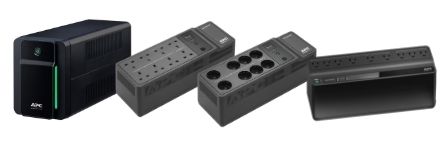Hi,
When I lived in the countryside in England power outages were a very frequent occurence for me. On average we would get:
- Every week: 2-5 second outage
- Every month: 1 minute outage (usually night time)
- Every 6 months: 1 hour+ outage
I ran lots of computer hardware including a home server so this was a problem. I invested in a couple of UPS units like those recommended here. One was a small standby only unit like the photo posted earlier, and it had the duty of running a small server and networking gear. I installed it 7 years ago - and it was still doing that job on the original battery (which could still support the load for 40 minutes when I tested it) when I moved out of that house.
I also had a larger unit that was classed as line interactive. These work in a similar way to the standby units with the inverter only kicking in once power fails, but they also include a large autotransformer. This allows them to step the voltage up/down without wasting battery power running the inverter. I used this unit to run everything else in my room - including a powerful desktop computer + accessories, a TV + games consoles and lighting.
The only issue I ever noticed with not using a real on-line UPS is that my flourescent desk lamp (which is NOT designed to run off a modified sine inverter anyway) would flicker very slightly when the power switched to the inverter. In real life the very small drop out of a modern standby UPS is not enough to upset equipment.
tl:dr; A standby UPS of appropriate capacity will be perfectly fine for backing up TV gear. Just make sure you buy a quality brand and that you size it well enough. Right now I have an APC ES 750G on my desktop computer and monitor. The power in Tokyo is reliable, but they give us a breaker with a stupidly low rating (30A at 100V - only 3KW) so it is easy to trip it by accident in the winter.
It comes with some software that lets you monitor it - here is mine:



